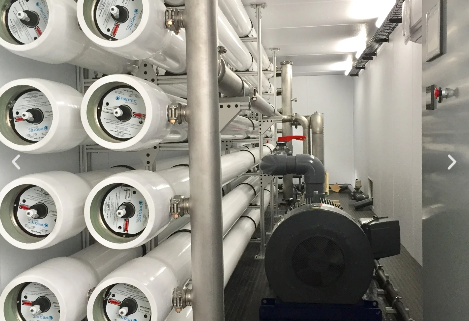Which is the Best Containerized RO for Industry?
Water molecules are forced through a semipermeable membrane by pressure in the reverse osmosis water purification process, which eliminates impurities. Water is left clean and pure after this membrane removes contaminants like chemicals, salts, and other dangerous materials. RO is an essential technology for industrial applications where water quality is crucial because of its high efficacy in creating high-quality water.
Containerized RO systems are transportable equipment for purifying water that are kept inside regular shipping containers. These systems come with pre-filters, high-pressure pumps, RO membranes, and post-treatment filters, among other necessary parts, all neatly packaged for portability and deployment. Containerized units, as opposed to typical RO systems, are made for quick setup and use, which makes them perfect for a range of industrial applications.
Portability is one of the main benefits of containerized RO systems. These units are versatile for companies that need mobile or temporary water purification solutions because they are easy to move to various industrial sites. Their ability to be installed quickly and easily thanks to its modular design minimizes downtime and guarantees a steady supply of water.
Industrial water filtration can be accomplished at a reasonable price with containerized RO systems. Their operating expenses are reasonable, and the initial expenditure is less than building permanent water treatment plants. Their cost-effectiveness renders them a desirable choice for sectors seeking to enhance their water treatment procedures without requiring substantial upfront investments.
Containerized RO systems offer a consistent supply of high-quality water because they are made to function well in a variety of environments. For businesses where the quality of the water directly affects industrial processes and product quality, this dependability is essential. With the use of cutting-edge filtration technology, the risk of contamination and interruptions to operations is reduced and the water is guaranteed to fulfill strict industrial standards.
Water is utilized in the manufacturing and process sectors for a variety of purposes, including as cooling, cleaning, and raw material utilization. In order to maintain product standards and avoid equipment damage from impurities, containerized RO systems make sure that the water used in these operations is of the highest quality.
Large amounts of filtered water are needed for the production of steam in power plants, especially those that use steam turbines. Reliable demineralized water is supplied by containerized RO systems, guaranteeing the turbines’ safe and effective functioning. Their mobility makes it simple to deploy them at various locations for the production of electricity.
High-quality water is essential to the food and beverage industry’s production processes. By removing impurities from the water used in the manufacture of food and beverages, containerized RO systems preserve the quality and safety of the final product. These systems offer an effortless way to purify water and are simply integrated into production facilities that are already in place.
The robustness and efficiency of RO systems have been increased as a result of recent developments in membrane technology. These days, high-performance membranes have longer operational lives and better rates of pollutant removal, which lowers maintenance requirements and expenses.
With RO systems, energy consumption is a big worry. Containerized RO systems are now more energy-efficient, lowering their operational costs and environmental impact. Examples of these innovations include energy recovery devices and high-efficiency pumps.
Automation and remote monitoring features are being added to more and more containerized RO systems nowadays. With the help of these features, system performance can be monitored in real time, facilitating prompt problem diagnosis and decreased downtime. In addition to optimizing system performance, automated controls also increase dependability and efficiency.
Industries frequently deal with issues including inconsistent water quality, expensive operations, and strict regulatory regulations. These difficulties may affect the efficacy and efficiency of water filtration systems.
With their cutting-edge filtration technology, affordability, and adherence to industry standards, containerized RO systems meet these issues. Their sturdy design and low maintenance requirements further increase their industrial application appropriateness, offering dependable and effective water filtration solutions.
The use of containerized RO systems has significantly increased operational efficiency. Businesses have experienced better product quality, lower equipment downtime, and higher production. The importance of containerized RO systems in improving industrial processes is highlighted by these advantages.
Through the provision of a dependable water source without the need for substantial infrastructure, containerized RO systems advance sustainability. They are even more environmentally friendly because of their incorporation of renewable energy sources.
The sustainability of RO systems depends on efficient waste management. To reduce their negative effects on the environment, contemporary containerized RO units are outfitted with waste management systems to control brine and other byproducts.
Initial Investment vs. Long-Term Savings
RO systems provide better water quality and efficiency when compared to other techniques like chemical or distillation treatment. Additionally, they are simpler to scale for bigger populations and have lower operating expenses.
With continuous technological improvements, containerized RO systems have a bright future in the industrial sector. Further advancements in performance and cost-effectiveness are anticipated as a result of developments in automation, energy efficiency, and membrane technology.
In the area of containerized RO, there is a lot of room for innovation. New technologies such as IoT and AI can improve system maintenance and monitoring, guaranteeing peak performance and minimizing downtime.



